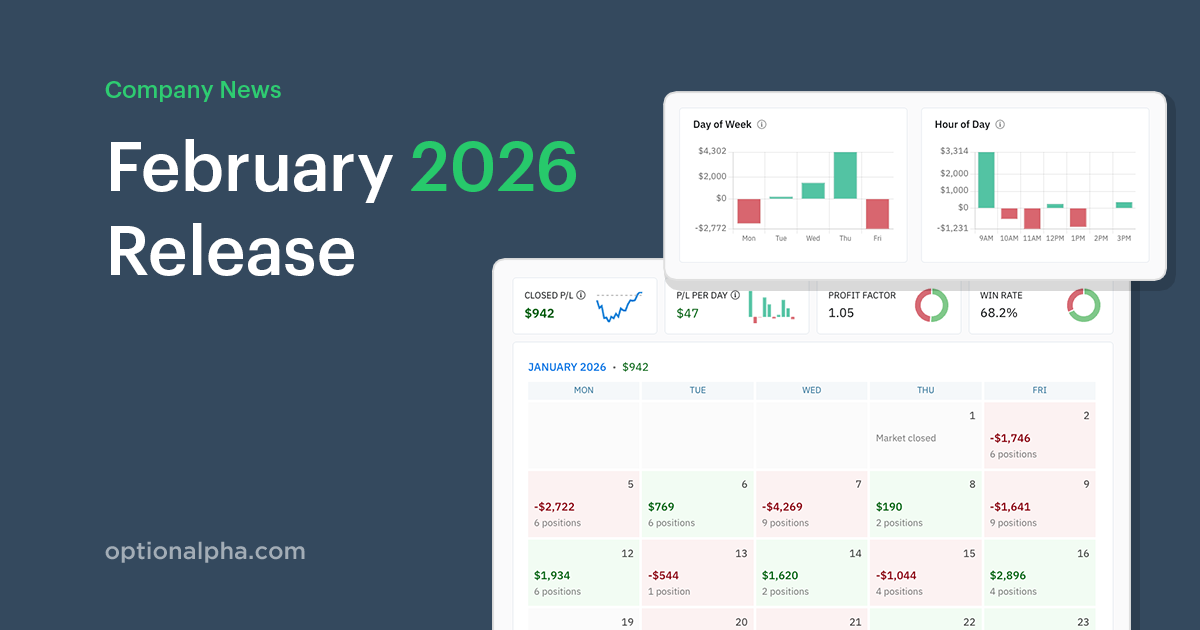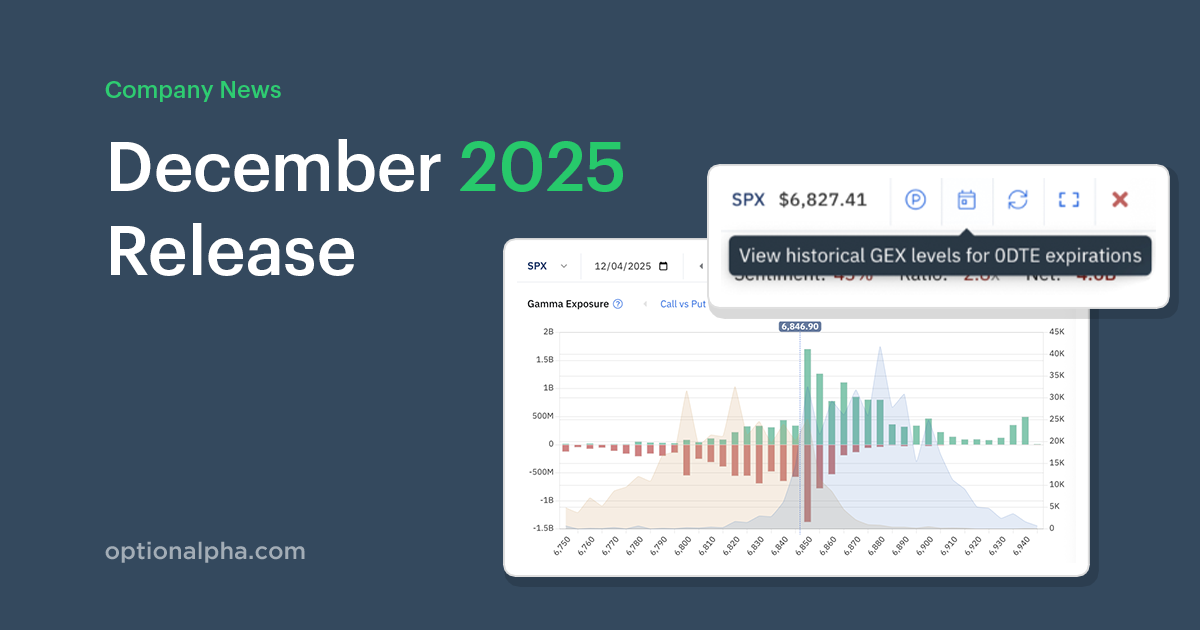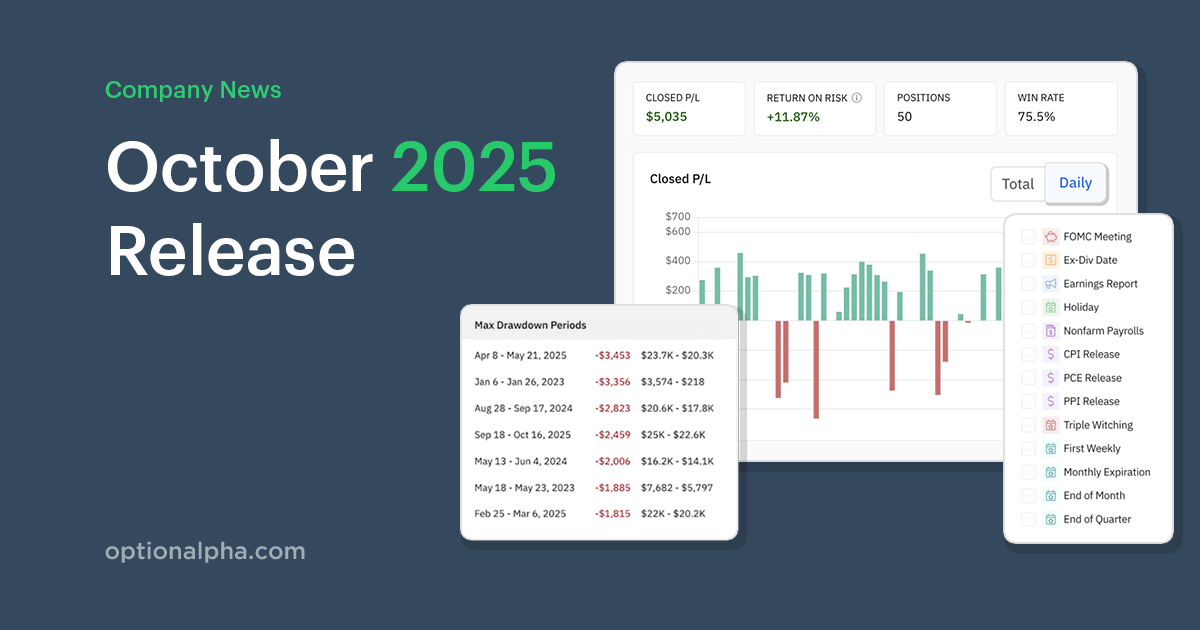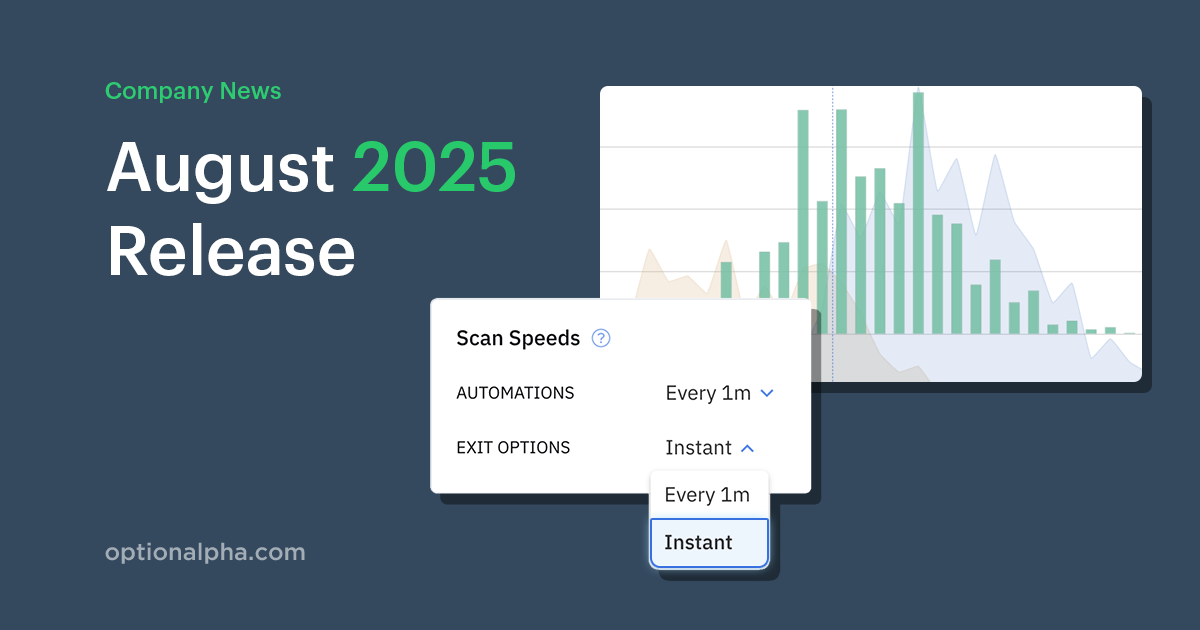Super Bowl LVIII is February 11th, 2024. Super Bowl Sunday features the Kansas City Chiefs and the San Francisco 49ers. The game is in Las Vegas, which only seems appropriate.
Last year, 50.4 million gamblers bet $16BIL on the Super Bowl. It is the biggest day of the year for football fans and sports bettors. But, it is the last game of the NFL season. What are die-hard football fans going to do for seven months while there are no football games to bet on? Maybe there’s another option for those looking to make smart wagers over the summer (and beyond).
It’s no secret that sports betting and the stock market have a lot in common. In this article, we’ll highlight the similarities between football betting and trading to help sports bettors interested in transitioning to options trading, and demonstrate how Option Alpha can help you find trades with high probabilities and positive expectancy -- a rarity in the world of sports betting.
Super Bowl LVIII Betting Line
A point spread handicaps two teams, essentially evening the playing field for different opponents. The team expected to win must beat the underdog by a minimum value to 'beat the spread.' At the time of this writing, the San Francisco 49ers are 2-point favorites.

If you bet on the 49ers with the point spread, they must beat the Chiefs by 3 or more points. If they win by exactly two points, it’s a push; no money won or lost.
The odds that San Francisco will beat the spread and win by more than two points are -112, meaning you’d need to wager $112 to win $100, an 89% reward to risk ratio.
Conversely, the Chiefs are 2-point underdogs. If they lose by one point -- or win outright -- they ‘cover the spread.’ The odds of Kansas City covering are -108, slightly better than the 49ers to beat the spread.
Because the book sees the 49ers as slight favorites, you’d have a lower reward/risk ratio if you pick them to win outright without the spread. This is known as a ‘moneyline’ bet.
The moneyline is -130. You’d need to wager $130 to win $100. Your reward/risk drops to 77% because the oddsmakers believe there’s a higher probability San Francisco wins the game straight up.
Did you know there's a way to invest that replicates all of these things you're already doing in sports betting? Let’s explore how betting on the Super Bowl has a lot of parallels to options trading, with a focus on probabilities, reward/risk, and expected value.
Expected Value (EV) is a fundamental concept in probability theory that provides insight into the outcome or value of a random variable. To put it simply, EV is a weighted average of all possible outcomes. It serves as a powerful tool for decision-making and risk assessment.
Super Bowl Betting History
Favorites have covered the spread in 52% of Super Bowls, 29 of 56 games (Super Bowl XLIX was a pick’em between the Seattle Seahawks and New England Patriots, so there was no favorite). So, is it better to bet on the favorite or the underdog to win the Super bowl?
Betting on the favorite to win the Super Bowl
If you bet on the 49ers to win by more than two points, a better than 50/50 outcome based on historical data, is that a good bet given the reward/risk ratio? Let’s find out using the historical probabilities and current odds:
(29 x $100) - (27 x -$112) = -$124
You would have lost $124 over 50+ years based on a $112 bet for each game. As we might expect, it’s almost a toss-up, with the house coming out as slight winners despite the higher odds of the favorite beating the spread.
Betting on the underdog to win the Super Bowl
And the other side of the same bet? If we bet on the underdog Chiefs to cover the spread, it looks like this:
(27 x $100) - (29 x -$108) = -$432
Betting on the favorite and the underdog both yield a negative expected value.
To be fair, the odds payout isn’t always exactly the same as it is for this year’s game, but spread odds are typically around -110 so it's a good barometer. The point stands: the house has the edge over the long run. Are we surprised?
Betting on a Super Bowl upset
What if you want to make a high-risk, high-reward bet? Say, the Chiefs winning by more than 10 points. The numbers change significantly.

Kansas City’s odds are currently +458 if you make them 10-point favorites. A $100 wager would net +$458 if they won by 11 or more points (a reward/risk ratio of 458%).
This makes sense: a much higher point spread impacts the odds dramatically. But what is the probability of that happening? And how does that compare with the current odds and payouts?
34 of 57 Super Bowls have been decided by more than 10 points. However, the underdog has only won by double-digit points in nine games or 16% of the time.
Would betting on the underdog to upset the favorite by more than 10 points be a good wager? This type of setup closely resembles a long call option. The payout is enticing, but the odds are low.
Let’s again use expected value to see if this is a good bet based on historical data and current odds.
If you were to make a $100 bet that KC would win by more than 10 points using the current odds of +458 and the 16% probability of success, your expectancy would be -$12:
(9 x $458) - (48 x -$100) = (-$678 / 57) = -$12
Even with a high reward/risk ratio, the low probability outcome makes this a poor bet.
Options Trade Ideas
Now let's apply this concept to options trading. Did you know you can bet on a stock the same way you bet on a football game? You can even pick and choose the odds and risk you want for hundreds of ticker symbols, like Apple (AAPL), Microsoft (MSFT), Amazon (AMZN) and more.
Options allow us to create positions with a high probability of success, a reward/risk greater than 100%, and positive expected value. In fact, we can do it much easier than betting on a football game because there are far more stocks and trading opportunities. Plus, we can do it a lot more, which allows us to stack high probability bets with favorable reward/risk profiles over and over (not just on Sundays four months a year).
We can take it further and let Trade Ideas find these setups for us. Trade Ideas looks for opportunities throughout every day, continuously updating probabilities and pricing using real-time market data.
Trade Ideas displays all potential trades with the essential information we’re used to seeing when betting on a football game: max potential profit and max potential loss.
But Trade Ideas also shows us other important data that is not easily found in sports betting: probabilities and expected value (EV). For each potential trade, we see the position's probability of profit (POP), probability of max profit (PMP), and probability of loss (PML).
Suppose you want to search for positions with a probability of max profit over 50% and a reward/risk better than 1:1. Trade Ideas shows us all the potential trades that fit our criteria, and we can quickly see which of those trades have a positive expected value.

Above, we can see multiple trades that have a greater than 50% chance of realizing a max profit that all pay out more on the winners than when they lose.
To use this week’s Super Bowl as an example, we know that there is a slight edge to betting on the favorite. Historically, there is a 52% chance the favorite beats the spread. But it is always a less than 100% reward/risk, which creates negative EV long term.
Sports bettors often search for anomalies to gain an edge. Imagine a bet that pays out more on wins than losses and has a higher than 50% odds of winning. Good luck finding that in the world of sports betting. It's almost unheard of. But with Trade Ideas, it’s only a few clicks away.
You can try Trade Ideas for free! Create an account and start your free 30-day trial.
Similarities of Sports Betting and Options Trading
Here’s the reality about sports betting and options trading: nobody can predict the outcome. Teams can win or lose. Stocks can go up or down. All we can do is analyze probabilities, make calculated decisions based on math and probabilities, and focus on risk management.
The goal of options traders and sports bettors is to find an edge in the market. And then exploit that edge as many times as possible over a large sample size. We dive deep into probability theory and share the data here: How Many Trades Does it Take to be Successful.
It takes a lot of trades for probabilities to play out. Risk management is crucial. Too often, traders and gamblers are tempted to make large wagers on a single bet or trade. In a small sample size, anything can happen, so it’s critical that we make many small bets to allow ourselves to stay in the game long enough to exploit the edge.
Market makers and sportsbooks
Sportsbooks set the initial line for every game. As more and more gamblers bet on the outcome, the line changes.
In options trading, market makers are responsible for creating a market. They set the initial prices and then market participants influence option prices through supply and demand, the same way the public moves the betting line through their wagers.
As you can image, market makers and sportsbooks are very good at what they do, so it is increasingly difficult to find an edge, especially with modern technology.
Line movements & price changes
A football game’s betting odds are dynamic and always changing until right before kickoff. Options prices change even more, every second for highly liquid tickers like SPY. That's why it's imperative we use real-time data that is updating constantly.
One key parallel is you can exit a bet during the game and an options trade during the trade. An options trade and a football both game have a finite lifespan; a game is 60 minutes and every option contract has an expiration date. But you can always close your position early (cash out in betting terms) to lock in profits or minimize losses. This is especially important as variables change: players get injured, news impacts a stock price, etc.
Advantages of Options Trading
Options trading offers multiple benefits for investors, including more opportunities, various risk management strategies, access to real-time data, and the ability to leverage automated tools that calculate probabilities to find and manage trades.
Consistent opportunities
The financial markets provide consistent opportunities for options traders, irrespective of specific events like a football season's end. The NFL has up to 16 games a week. Trade Ideas filter hundreds of thousands of opportunities every day.
Markets operate continuously, allowing traders to engage and adapt to changing conditions. Options trading makes achieving a large sample size much easier to let probabilities play out and reduce outlier results.
Global market access
Options trading transcends geographical boundaries, providing access to a global array of assets and markets. This global reach offers more diverse opportunities than betting on individual sporting events.
Diversification benefits
Options trading allows for easier portfolio diversification beyond what sports betting can offer. Traders can diversify across industries, sectors, and asset classes, reducing risk exposure to a single event or outcome.
Risk control and flexibility
Options traders have greater risk control through strategies like stop-loss orders and hedging. The flexibility to adjust positions in response to market developments distinguishes options trading from the relatively fixed nature of sports bets. Although, this has changed quite a bit as sports betting has become more widely available through mobile apps. Almost all sportsbooks now include live in-game betting, so there are arbitrage opportunities for active bettors.
Conclusion
It is important to note that options trading involves a lot more intricacies than sports betting. While we’ve highlighted the similarities, there are numerous factors that you must take into account when trading options. You should take the time to educate yourself before making any live options trades. I highly recommend starting here if you're new: Options Trading Basics for Beginners.
For those looking to expand into options trading, there are many correlations between options trading and betting on football games. The Super Bowl is the biggest sporting event of the year, but it is a singular game. Options trading gives us the ability to make smarter, more frequent bets on a much larger market. Betting on the Super Bowl may provide a way to engage in the big day with a bit of fun. But if you’re looking to make high-probability trades, it is worth exploring option trading once the season ends.
If you're new to options trading, visit our FREE options trading education. We have courses with dozens of guided videos, in-depth strategy guides, free research, and much more to help you get started with options trading.





.png)








